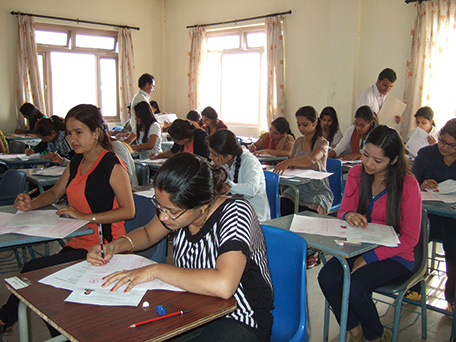Japan's Official Development Assistance White Paper 2012
Stories from the field 10
Improving Quality of Nurses Through National Examination System
– Japanese Introduces Nepal's First Testing System –

Ms. Miyamoto preparing the national examination with NNC members (Photo: Kei Miyamoto)
Nepal's first National Licensure Examination for Nurses (NLEN) was held in the capital city of Kathmandu on May 11, 2012. It is no exaggeration to say that the system could not have come to fruition without JICA Senior Volunteer Kei Miyamoto. Ms. Miyamoto has been assigned to the Nepal Nursing Council (NNC) and has offered assistance by holding committee meetings for institutionalizing the national examination, holding briefings all over Nepal and preparing guidelines, rules and questions for the national examination without bending to various political pressure or protests.
After earning her qualification as a nurse, Ms. Miyamoto worked in pediatric care unit at a university hospital in Tokyo, and during her term of service there, she became aware of the apartheid in South Africa. She learned that people were discriminated against and their lives threatened because of their race, the color of their skin and where they were born. She felt she could fulfill the essence of medical care just in such a place and became interested in international cooperation. She gained experiences in nursing education and community health at hospitals and universities in Japan and got involved in improving community health and teaching and offering guidance to local nurses, first for Rwandan refugees in 1996 and later in Cambodia, the Dominican Republic and other developing countries.
In 2006, Ms. Miyamoto began educating nurses at a Nepalese public technical school as a JICA Senior Volunteer. What she observed in Nepal was that nursing education was facing a critical situation. Each country has its own qualification system for nurses, and Nepal had adopted a system by which nurses registered with the NNC after graduating from university nursing departments or technical schools. However, by the time Ms. Miyamoto arrived, the business of running nursing schools had become reliably profitable, and schools were springing up but bringing down the quality of education because of a lack of educators and practical training. In 2008, the NNC began preparing a national examination for nurses in order to rectify this situation and improve the quality of nurses.

Nursing students taking Nepal's first NLEN (Photo: Kei Miyamoto)
Ms. Miyamoto was assigned to the NNC in June 2010, and when she participated in a project to introduce the examination, she became aware of ulterior motives and pressure within the council that created an unstable atmosphere. Some of the people who ran nursing schools applied political pressure for fear that their students would not be able to become nurses if a national examination were instituted. The NNC building was blockaded, and four sittings of the examination committee witnessed protests. "Special interests created an overwhelming force, and there was political instability," Ms. Miyamoto recalled. "Those days illustrated to me the difficulty of taking the lead in the nursing industry and striving to improve nursing services and nursing education as well as the strength required to go through with taking action."
In the course of preparing the national examination, Ms. Miyamoto expended the most energy on making sure that local staff members sought to do their jobs faithfully. Nepalese show an outstanding ability to carry out short-term projects but do not so well in long-term. She often had to hold back Nepalese who rushed through their work and force them to rethink their way of working.
Even when it came to grading the national examinations that were finally administered on May 11, Ms. Miyamoto asked whether NNC graders had graded the examinations accurately. "It was the night before the grades would be posted," she recalled. "It was 10:00 at night, and everyone was tired and wanted to go home. I asked them, 'Are you satisfied with the final results you checked? If there are any mistakes in the grading, people will lose faith in NNC and we will not get the chance to give another examination. Are you sure you want to stop here?' Then, the graders agreed to check the examination results until they were satisfied – they sat down again on the floor and began checking to make sure the grades were correct."
Ms. Miyamoto saw the graders get back to work and felt secure that they would always grade examinations accurately and without rushing. However, instituting the NLEN is only the first step toward raising the level of medical and health care in Nepal. "I hope that health care and nursing education will be separated from political strife so that nursing services improve," Ms. Miyamoto said. "And, I hope that they re-establish a nursing department within the Ministry of Health and Population so that a system will be established, in which nursing professionals actively cope with nursing issues as experts in national health care in an independent manner."
